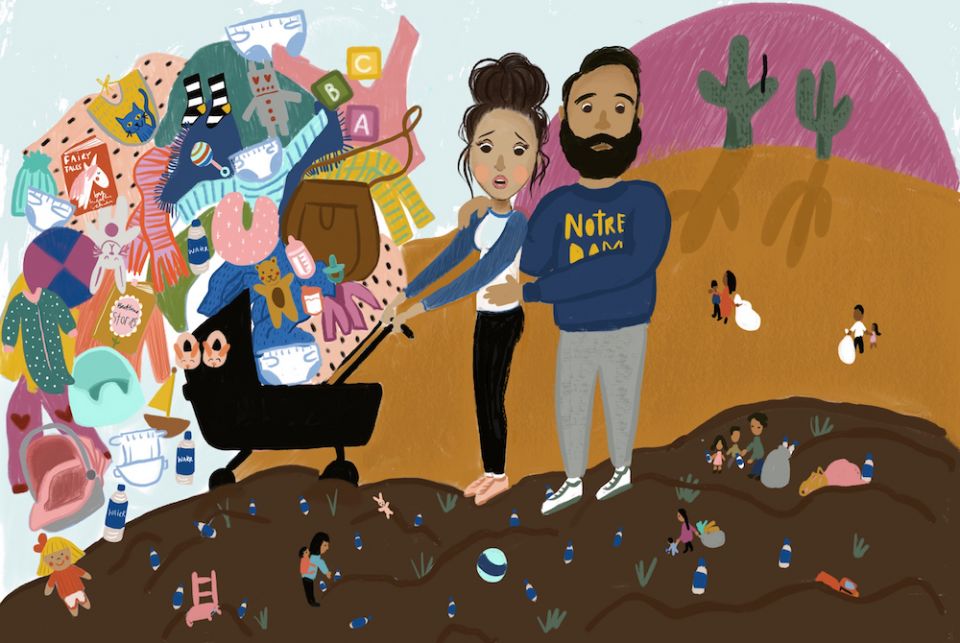Should a Catholic couple have children?

Mandy Easley is trying to reduce the size of her consumer footprint on the planet. She switched to reusable straws. She and her boyfriend recycle plastic and other household items. The couple have a habit of feeding others who don't have access to unlimited resources - the rescue dogs find a foster home in the Easley family and, as a Bellarmine University alumni, Easley travels to Guatemala to accompany the students. in a service-oriented spring break.
Easley, 32, and her fiancé, Adam Hutti, have no plans to give birth, in part because they can't help but see the world through the lens of rapidly changing climates. * Easley realized while accompanying a mission trip to Guatemala claims that his climate activism is fueled by the problems of homelessness and poverty. Watching households extracting electronic waste from a landfill to burn plastic and sell aluminum and glass so they could afford to send their children to school, she realized that the immense waste of a modern throwaway culture becomes the burden of other countries, other cities and other people seeking to thrive.
Active in their Louisville community and aware of the lack of resources that so many people experience, Easley and Hutti are interested in looking for local adoption agencies after getting married.
“There are a lot of things coming on the horizon and it doesn't seem responsible to bring a new life into that chaos,” Easley said. "It makes no sense to bring more children into the world when there are, especially in Kentucky, so many children in foster care."
Easley knows that the systemic changes made by governments and businesses may be more effective than the small steps he is taking in his life, but he feels empowered by his vision and how he reflects his Catholic values.
Remember the words of Jesus in a passage from Matthew's scriptures: "Whatever you did for the least of them, you did for me."
"What about those children who are waiting to be adopted?" she said. "I have to believe that if we choose to adopt or promote the children who are being born, it has some value in God's eyes. It has to."
"Laudato Si ', on Care for Our Common Home" inspires Easley's service to its community and the world at large. "Francis' encyclical on climate change that has impacted the poor was one of the most revolutionary pastoral responses to what is happening in the world," he said.
As Francis writes, Easley acts like this: “We have to realize that a true ecological approach always becomes a social approach; it must integrate questions of justice in debates on the environment, so as to hear both the cry of the earth and the cry of the poor "(LS, 49).
When a couple marries in the Catholic Church, they swear during the sacrament to be open to life. The Catechism of the Catholic Church emphasizes this responsibility, stating that "conjugal love is ordered to the procreation and education of offspring and it is in them that it finds its crowning glory".
Perhaps because the position of the church on procreation, cemented by Pope Paul VI's document Humanae Vitae in 1968, is unchangeable, Catholics who ask themselves the question of having children tend to turn everywhere except to the church for answers.
Julie Hanlon Rubio teaches social ethics at the Jesuit School of Theology at the University of Santa Clara, and recognizes the gap between promoting official church teaching, such as natural family planning, and a desire for Catholics to participate in groups that offer authenticity and concreteness help of discernment.
"It's hard to do all of this alone," he said. "When there are places structured for this kind of conversation, I think it's really good."
Catholic social teaching calls Catholics to the family as a "fundamental structure", but it also asks believers to be in solidarity with others and to care for the Earth, values that many middle-class millennials embrace, having grown up in a global world and digitally connected smaller by the vast industries of consumerism and technology.
This embrace can lead to anxiety about climate change and the role of American families in resource consumption. The sensation even has its name: "eco-anxiety". Hanlon Rubio states that in his own students he often hears about eco-anxiety and while it may seem overwhelming to consider the planet in lifestyle choices, it is important to remember that perfection is not an end goal.
"I think it's nice to have this awareness while also realizing that the Catholic tradition actually realizes that no one can avoid any material cooperation with evil," said Hanlon Rubio. "Environmental scientists are also saying, 'Don't let personal perfection suffocate you so you don't have the energy for political defense.'